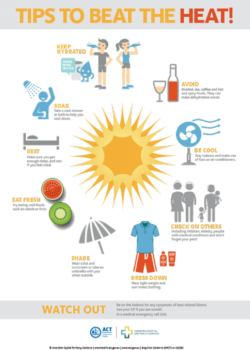Summer Health

Withstanding Summer’s Heat. Tips for sun-smart health
Summer in the city: a season for wandering through street festivals, enjoying outdoor activities, relaxing in the sun and—ideally—not getting a sunburn along the way. Although welcome, the summer season brings with it a few intrinsic health risks to be wary of while out enjoying fun activities. To help you navigate them like a pro, here are some basic tips for avoiding and treating sunburns, dehydration and blisters this summer season.

Staying Sun-conscious
Although a tan might be fashionable, the serious consequences of skin damage are not. To protect against UV radiation, use a water-resistant sunscreen with an SPF of 30 or greater and reapply it every two hours. If you have sensitive or acne-prone skin, consider using a non-comedogenic sunscreen or a mineral-based zinc titanium sunscreen lotion. Other sun-savvy options include wearing lightweight, long-sleeved clothing, sunglasses and hats and avoiding being out during midday when the sun’s radiation is most intense.

Healing Sunburns
Sunburns can still happen even when you’re careful. When they do, cool them off as quickly as possible by taking a cool shower or by using a cold compress. Do not, however, place ice directly on your skin.
Some effective products that help soothe sunburns include aloe vera gel (try keeping it in the refrigerator), medication such as ibuprofen or aspirin (which help with pain and inflammation), and an anti-itch cream to relieve the itching that comes with healing. A cool bath with either a cup of baking soda or white/cider vinegar can help remedy sunburns as well.

Keeping Hydrated
The summer season is usually an active one, so take extra care to stay hydrated at pools and saunas, as you may not realize how much water your body has lost through exercise and perspiration. If the taste of plain water doesn’t do it for you, consider alternatives such as fruit and/or vegetable juices, smoothies, sports drinks, vitamin water, chilled herbal teas or water flavoured with lemon or lime.
Treating Blisters
Blisters are another common nuisance that pop up during summertime activities. Whether caused by hiking with new boots, adjusting to life in flip-flops or a campfire cooking burn, blisters should be left alone as much as possible since the top skin provides a protective barrier against bacteria, which aids in healing. That means avoid the temptation to pop them! If you can’t, apply an antibiotic ointment and a sterile, loose bandage to protect the broken blister from further damage.

More Like This
Backyard Home Theatre
Read
Edmonton From Above
Read
‘Motoring’ around Edmonton
Read





